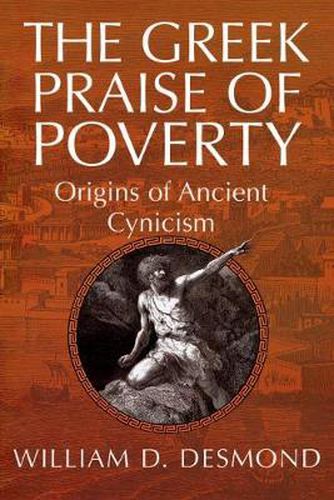Readings Newsletter
Become a Readings Member to make your shopping experience even easier.
Sign in or sign up for free!
You’re not far away from qualifying for FREE standard shipping within Australia
You’ve qualified for FREE standard shipping within Australia
The cart is loading…






William Desmond, taking issue with common popular and scholarly views of the ancient Greek Cynics, contends that early Cynics like Antisthenes and Diogenes were not cultural outcasts or marginal voices in classical culture; rather, the Cynic movement through the fourth century B.C. had deep and significant roots in what Desmond calls the Greek praise of poverty. Desmond demonstrates that classical views of wealth were complex and allowed for the admiration of poverty and the virtues it could inspire. He explains Cynicism’s rise in popularity in the ancient world by exploring the set of attitudes that collectively formed the Greek praise of poverty. Desmond argues that in the fifth and fourth centuries B.C., economic, political, military, and philosophical thought contained explicit criticisms of wealth and praise of poverty. From an economic and political point of view, the poor majority at Athens and elsewhere were natural democrats who distrusted great concentrations of wealth as potentially oligarchical or tyrannical. In contemporary literature, the poor are those who do most of the necessary work and are honest, self-sufficient, and temperate. The rich, on the other hand, are idle, arrogant, and unjust. These perspectives were reinforced by the Greek experience of war and the belief that poverty fostered the virtues of courage, strength, and endurance. Finally, from an early date, Greek philosophers associated wisdom with the transcendence of sense experience and of conventional values such as wealth and honor. The Cynics, Desmond asserts, assimilated all of these ideas in creating their distinctive and radical brand of asceticism. Desmond’s work is a compelling reevaluation of ancient Cynicism and its classical environment, one that makes an important contribution to scholarship of the classical and early Hellenistic periods.
$9.00 standard shipping within Australia
FREE standard shipping within Australia for orders over $100.00
Express & International shipping calculated at checkout
Stock availability can be subject to change without notice. We recommend calling the shop or contacting our online team to check availability of low stock items. Please see our Shopping Online page for more details.
William Desmond, taking issue with common popular and scholarly views of the ancient Greek Cynics, contends that early Cynics like Antisthenes and Diogenes were not cultural outcasts or marginal voices in classical culture; rather, the Cynic movement through the fourth century B.C. had deep and significant roots in what Desmond calls the Greek praise of poverty. Desmond demonstrates that classical views of wealth were complex and allowed for the admiration of poverty and the virtues it could inspire. He explains Cynicism’s rise in popularity in the ancient world by exploring the set of attitudes that collectively formed the Greek praise of poverty. Desmond argues that in the fifth and fourth centuries B.C., economic, political, military, and philosophical thought contained explicit criticisms of wealth and praise of poverty. From an economic and political point of view, the poor majority at Athens and elsewhere were natural democrats who distrusted great concentrations of wealth as potentially oligarchical or tyrannical. In contemporary literature, the poor are those who do most of the necessary work and are honest, self-sufficient, and temperate. The rich, on the other hand, are idle, arrogant, and unjust. These perspectives were reinforced by the Greek experience of war and the belief that poverty fostered the virtues of courage, strength, and endurance. Finally, from an early date, Greek philosophers associated wisdom with the transcendence of sense experience and of conventional values such as wealth and honor. The Cynics, Desmond asserts, assimilated all of these ideas in creating their distinctive and radical brand of asceticism. Desmond’s work is a compelling reevaluation of ancient Cynicism and its classical environment, one that makes an important contribution to scholarship of the classical and early Hellenistic periods.